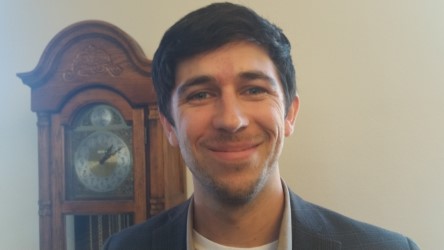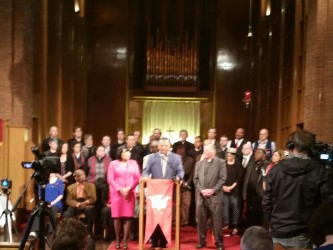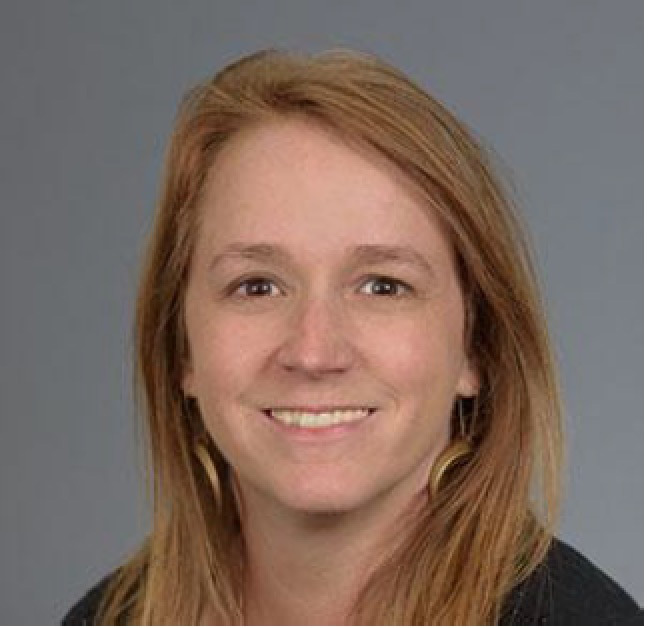As we celebrate another 4th of July, we take a moment to reflect on the beginning of our U.S. democracy --
On July 4, 1776, 56 men (average age 44), representing 13 former British colonies, assembled as the 2nd Continental Congress in Philadelphia to adopt the Declaration of Independence.
When news of the Declaration of Independence reached New York City, it started a riot. On July 9, 1776, with hundreds of British naval ships occupying New York Harbor, George Washington, commander of the Continental Army, read the document aloud in front of City Hall. A raucous crowd cheered and later that day tore down a nearby statue of George III. The statue was subsequently melted down and shaped into more than 42,000 musket balls for the fledgling American army. Americans had had enough of tyranny, and set out to establish a new kind of government which would be ruled not on the whim of a tyrant, but by the will of the of the people, where freedom of speech was guaranteed, and all men were treated equally, entitled to pursue life, liberty, and the pursuit of happiness.
World War II General, and President of the U.S., Dwight D. Eisenhower advised, “Freedom has its life in the hearts, the actions, the spirit of men, and so it must be daily earned and refreshed, - else like a flower cut from its life-giving roots, it will wither and die.”
On a lighter note, American humorist, Erma Bombeck writes, “You have to love a nation that celebrates its independence every July 4, not with a parade of guns, tanks, and soldiers who file by the White House in a show of strength and muscle but with family picnics where kids throw Frisbees, the potato salad gets “iffy”, and flies die from happiness. You may think you have overeaten, but it is patriotism “
SALEM RALLY

David Groth, Marilyn Mauch, Claudia Roberts, Bonnie Gregg , Sara Chan, Les Wardenaar, Sarabelle Hitchner, Rev. Mark Knudson, Carol Turner, and Sarah Carolus
On June 6, 2017 Interfaith Alliance members representing Westminster Presbyterian, Augustana Lutheran, Madeleine Catholic, Fremont Methodist, First Unitarian, and Central Lutheran Churches together with Jessica Rojas of the NE Coalition joined a rally on the steps of the state house, sponsored by the Better Oregon Coalition. The coalition included parents, students, teachers, nurses, small business owners, unions, social workers, the Ecumenical Ministries of Oregon, economists, and other community advocates from every region in Oregon.
Their message was simple, Oregon is in crisis and our children, our schools and colleges, small businesses, health care programs, the elderly and people in poverty need help now.
According to studies by the Tax Foundation Oklahoma, Oregon, and North Carolina have the lowest corporate tax burdens in the nation. More Oregon corporations are finding a way to avoid being subject to the state's corporate income tax, In 2004, 35,880 Oregon corporations filed income tax returns. By 2014, that number had dropped to 29,376. With major cuts on the table due to the state’s $1.4 billion deficit speakers at the rally demanded that legislators take immediate action to address the need to make corporations pay their fair share.
WE CAN’T WAIT! the crowds shouted! INVEST IN PEOPLE, NOT CORPORATIONS!
"When we better fund education, health care and other critical services we improve the productivity and vitality of the our state," said Hanna Vaandering, the president of the Oregon Education Association. "We as a coalition refuse to accept cuts to services for students and those in need as long as corporations in Oregon are paying lower taxes here than anywhere else in the country."
Rev Mark Knudson, pastor of Augustana Lutheran Church in Portland declared that our budget expresses the values of the people of Oregon and noted that a society is judged by the way in which they treat the most vulnerable among them, the children, the elderly, the poor, the sick, etc. Also educated, healthy people are good for our state’s economy.
He quoted from Martin Luther King, Jr. speech in which Dr. King said, “I have the audacity to believe that peoples everywhere can have three meals a day for their bodies, education and culture of their minds, and dignity, equality, and freedom for their spirits. I believe that what self-centered men have torn down, men other-centered can build up. I still believe that one day mankind will bow before the altars of God and be crowned triumphant over war and bloodshed, and nonviolent redemptive goodwill will proclaim the rule of the land.” B. Gregg
URGENT: STOP LEGISLATION FROM PUTTING 1,800 KIDS AT RISK OF LOSING TANF
Partners for a Hunger-Free Oregon advise that on Monday, June 26, 2017, as part of the Human Services Budget (SB 5526)—an Oregon legislative committee passed a cut which would disqualify 1,800 kids who participate in the Temporary Assistance for Needy Families (TANF) who are being cared for by low-income relatives.
“If this cut passes, Oregon would enact the harshest policy in the country. In fact, only three other states have similar policies. This would likely result in decreased benefits for kids, more kids in foster care and more money spent on administrative costs.
“Not only would this budget proposal cut important benefits for kids, it would make it harder for families to stay together. Currently, when a non-parent relative—grandparent, uncle, cousin, older sibling—cares for a child and earns less than 185 percent of the federal poverty level, their income is not counted against their benefits. By design, this helps keep families together, encouraging relative care over foster care.”
Only two weeks are left in the legislative session to ensure this funding is restored. Contact your representative to oppose this cut now. John Elizalde
STATE AND FEDERAL LEGISLATORS NOW DECIDING
WHERE ”OUR MONEY” WILL GO
While members of the Interfaith Alliance rallied in Salem, in Washington, D.C., our representatives are gathering to consider the budget which has been proposed by our President.
ON THE CUTTING BLOCK:
----Health and Human Service cut 12.6 billion - .
$4.2 billion will be eliminated from community services programs like the Low Income Home Energy Assistance Program. National Institutes of Health will be cut by $5.8 billion.
----Education - cut 9.2 billion - After school and summer programs will be eliminated. Federal Supplemental Education Opportunity Grant for college students will be eliminated.
----Housing and Urban Development - cut 4.3 billion by eliminating Community Block Development Block Grant to fund anti-poverty programs, rental assistance, home ownership programs, and housing initiatives.
----Labor – cut 9.6 billion, scaling back job training programs including those aimed at helping seniors, disadvantaged young people and unemployed Americans. Training grants for occupational safety and health administration would be eliminated.
----Diplomacy and development would be severely cut, impacting: the United Nations. Climate-change initiatives at the United Nations would lose all their U.S. funding. The government would cut back its regular contribution to the U.N. and would pay no more than 25 percent of the cost of U.N. peacekeeping operations.
----The National Oceanic and Atmospheric Administration’s grants and programs for coastal and marine management, research and education would be eliminated and the Minority Business Development Agency, which supports minority-owned businesses would be reduced..
----The E.P.A. is among the hardest-hit agencies. The budget calls for the elimination of about 3,200 staff positions — over 20 percent of the department.
It would also eliminate all funding for enactment of the Clean Power Plan, the regulations designed to curb greenhouse gas emissions from power plants Funding for climate change research and international climate change programs would be eliminated.
----Programs to support research of breakthrough clean energy technology, including the Advanced Research Projects Agency-Energy and the Advanced Technology Vehicle Manufacturing Program would be eliminated.
----Nearly 20 smaller independent agencies, including the National Endowment for the Arts, the National Endowment for the Humanities, the Corporation for Public Broadcasting and the Legal Services Corporation, which finances legal aid groups would be eliminated.
BIG WINNER: Defense Budget Increase by $574 billion.
AFFORDABLE HOUSING IN CULLY

Cameron Herrington, Coordinator of Living Cully
At the May Alliance Planning Meeting, Cameron Herrington, explained how Living Cully works to expand affordable housing and prevent the displacement of residents threatened by rapidly increasing housing costs.
Cully is the “the most diverse community in the state”, with 50% people of color, immigrants, and refugees. Public transportation is limited; parks and libraries are lacking; sidewalks are few and streets have pot holes. Through its work in NE Portland’s Cully Neighborhood, Living Cully works to prevent displacement and assist low income residents in their fight against rising rents.
When residents of the Normandy Apartments, received notice last December that their rents had more than “doubled” from $630 to $1320 per month, Living Cully jumped in to help. They assisted the tenants in organizing a march and getting an attorney. The owner agreed to postpone the rent increase until July 1, enabling children to remain in their current school placement through the end of the school year.
This decision gave the tenants some breathing room, but they still needed to find affordable housing. Living Cully posted a message on the social media site “Next Door.” In response, Nancy Hiss offered an ADU “accessory dwelling unit” that she had built in her backyard to accommodate her parents, who are now deceased. At $900 a month, it was the answer to Normandy apartment tenant, Michelle Labra’s prayers.
The Interfaith Alliance has participated with Living Cully in supporting the Normandy apartment tenants and Oak Leaf mobile home park residents to achieve affordable housing. Living Cully partners include Habitat for Humanity Portland Metro East, Haciendas Community Development Corporation, NAYA (Native American Youth and Family Center) and Verde.
|
“KENTON VILLAGE HOME”
Fourteen tiny houses, about 8’ x 12’, have been constructed on a lot in the Kenton neighborhood to shelter homeless women. Communal kitchen and bathrooms are also provided. Catholic Charities will offer support services.
|
SAINT FRANCIS APARTMENTS
Home Forward is partnering with Catholic Charities and St. Francis of Assisi Parish to create an affordable housing community located in inner Southeast Portland
The plan for the St. Francis Apartments is to develop 102 apartment units that will include 73 studios, 28 one-bedroom units, one two bedroom unit and 33 parking spaces.
Ninety percent of the units will be for families earning less than 60 percent of the median income and ten percent will be units for those earning less than 30 percent of the median income. In addition 25 units will be reserved for victims of domestic or sexual violence.
The building will extend the full length of SE 12th Ave., along SE Stark St. and then continue halfway up SE 11th Ave. The apartment building will cover about fifty percent of the block. Most of the north half of the park will be landscaped as a semi-private open space
The project will replace a private park adjacent to St. Francis of Assisi Parish. St Francis Dining Hall, located in the basement of the church, serves 150-300 hot meals daily to the homeless of the area. Ground breaking for the housing project is expected in December of this year.
Home Forward is now the largest provider of affordable housing in Oregon. It has served all of Multnomah County, including the cities of Portland and Gresham, since 1992. The agency owns 2,600 public housing 3,700 affordable housing and administers 8,200 Section 8 housing assistance vouchers.*
NOTE: The Home Forward (HF) Section 8 Housing Choice Voucher waiting list is currently CLOSED. It was last open for five days in September 2016, and prior to that in November 2012. There is no notice of when the list will reopen and vouchers become available. There are currently 3,000 on the waiting list.
JESSE JACKSON SPEAKS OF PORTLAND MARTYRS

In response to the recent hate crimes in Portland, at the invitation of Rev. Mark Knudsen, the Reverend Jesse Jackson spoke to a public press gathering at Augustana Lutheran Church on June 2, 2017.
Rev. Jackson said that we must prayerfully acknowledge the “martyrs among us” whose lives are sacrificed as were the two men slain while trying to stop an “anti-Muslim” hate rant at the Max train station. He noted that “we may not be able to stop their crucifixion but neither can they stop our resurrection. We must become instruments of peace, not hate.” He recommended that when they march, we stay home, “denying them fuel for their hate.”
He observed that “poverty is an annihilation” and that we must “leave the racial battlefield to seek the economic common ground that will enable us to achieve the moral high ground where all men are treated equally in a global community.” We must “pull down the walls of ignorance to build bridges of understanding.” We must “remember that regardless of our color or religion, we live in “one big tent.” B. Gregg
PRAYER POWER WORKS
“Despite racist threats looming in the day leading up to the event, the 'Good in the Hood' parade went off without a hitch Saturday, June 24. “ (KGW News)
When Good in the Hood organizers received threats of “a blood bath”, they did not cancel their festival. They contacted the FBI, but did not hire armed guards. Instead they asked for PRAYERS from the faith-based communities of Portland. Interfaith Alliance members joined in this effort. Our thanks to all who participated.
1ST WORLD DAY OF THE POOR
On June 13, 2017, Pope Francis issued a papal message for the 1st World Day of the Poor, which will be held November 19, 2017.
“Some”, he said, "may think of the poor simply as the beneficiaries of our occasional volunteer work, or of impromptu acts of generosity that appease our conscience.” Instead he encouraged us “to see the faces marked by suffering, marginalization, oppression, violence, torture and imprisonment, war, deprivation of freedom and dignity, ignorance and illiteracy, medical emergencies and shortage of work, trafficking and slavery, exile, extreme poverty and forced migration. … [those] exploited by base interests, crushed by the machinations of power and money. … [and] poverty born of social injustice, moral degeneration, the greed of a chosen few, and generalized indifference!"
Pope Francis says “Let us love, not with words but with deeds.”
VOLUNTARY POVERTY
Adapted from the “Art of Letting Go: Living the Wisdom of St Francis”, by Fr. Richard Rohr
We all know Pope Francis, but are less familiar with his namesake, Francis of Assisi. Like today, in 1204 the world was obsessed with war, fear, and security. As a young man, Francis was imprisoned during the war between Perugia and Assisi. When finally released, he saw that greed at the expense of the poor, was causing great inequities and human suffering,
Walking away from a life of privilege, Francis chose to live in close proximity to and solidarity with the excluded ones in his society. He moved down into the plain below Assisi where there was a leper colony. “Lepers” did not always have the contagious disease of leprosy, but they were the people society deemed unacceptable, unworthy, or shameful for any number of reasons. Francis not only served the poor, he became one of them.
“Today”, Fr. Rohr says, “our planet is in grave peril largely due to greed, overconsumption, and reckless exploitation. While most of us are not like Francis, willing to dive into a life of voluntary poverty, we must all make choices and decisions to do our part to follow these wise words of an unknown speaker: “live simply so that others may simply live
UPCOMING COMMUNITY EVENTS
CULLY STANDS TOGETHER
Community gathering to promote the multi-cultural diversity and resilience of the Cully neighborhood will be held Saturday, July 8 – ll:00AM – 3:00 PM, at Trinity Lutheran Church, 5520 NE Killingsworth, Bus Line 72. There will be food, performances and fun for kids
Sponsored by Living Cully, Haciendas, Northeast Emergency Food Bank, Cully Blvd, Naya Family Center, 42nd Avenue, and Trinity Lutheran Church. Please bring food to share with neighbors.
VOLUNTEERS NEEDED:
Cully Mobile Home Repair/Maintenance
If you have a few hours to spare, your help is needed to clean up and upgrade Cedar Shade and Arbor Mobile Home Parks. Marilyn Mauch says, “I’m 83 going on 84 next year, so I can’t do any heavy lifting, but I can sure clean mold. And,” she added, “It’s a great way to meet your neighbors!” Whatever your skill level, your help would be appreciated.
Friday, July 6 and Friday, July 7 2-8 Miscellaneous/ General Repairs Cedar Shade Mobile Park, 7120 NE Killingsworth
Friday, July 14, and Saturday, July 15th - 9 Am-1PM - Roof Repair – Meet at Living Cully Plaza, 6723 NE Killingsworth
Thursday, July 27 and Friday July 28: 10AM-4PM – Miscellaneous/General Repairs – Arbor Mobile Home Park, 6415 NE Killingsworth Street
Sunday, July 30, 2-8PM, Window Repair – Cedar Shade, 7120 NE Killingsworth, and Arbor Mobile Home Parks, 6415 NE Killingsworth.
To sign up: Email Brenna Bailey: bbailey@stcharlespdx.org
 Street Roots Newspaper Seller, Lori Lematta, and Executive Director, Israel Bayer
Street Roots Newspaper Seller, Lori Lematta, and Executive Director, Israel Bayer

 By all these lovely tokens September days are here, With summer's best of weather And autumn's best of cheer. Helen Hunt Jackson
By all these lovely tokens September days are here, With summer's best of weather And autumn's best of cheer. Helen Hunt Jackson




 Dr. Mandy Davis, Executive Director, Trauma Informed Oregon, Portland State University
On Sunday, May 7, the Interfaith Alliance will be sponsoring a community-wide event featuring a presentation by Dr. Mandy Davis regarding the impacts of living in poverty. It will be held in the atrium at the MADELEINE PARISH, 3123 NE 24th from 1:30-5:30 PM. Light refreshments will be provided.
Dr. Mandy Davis, Executive Director, Trauma Informed Oregon, Portland State University
On Sunday, May 7, the Interfaith Alliance will be sponsoring a community-wide event featuring a presentation by Dr. Mandy Davis regarding the impacts of living in poverty. It will be held in the atrium at the MADELEINE PARISH, 3123 NE 24th from 1:30-5:30 PM. Light refreshments will be provided.